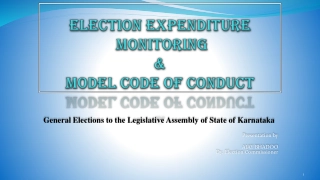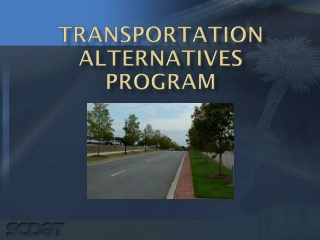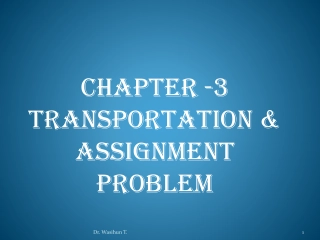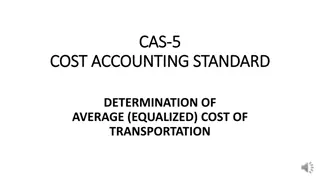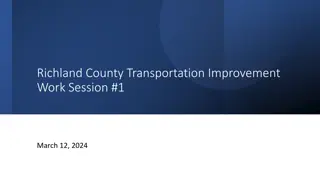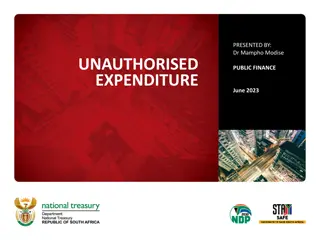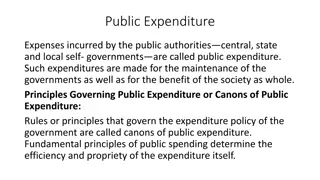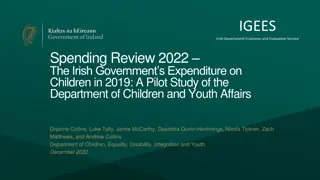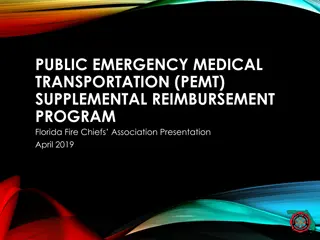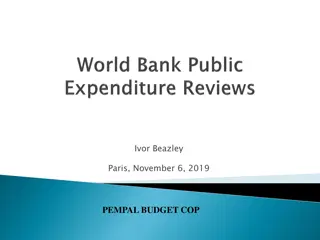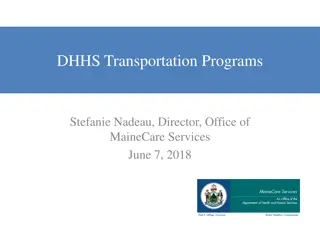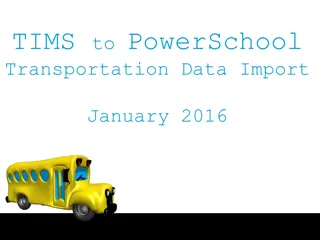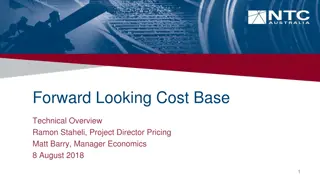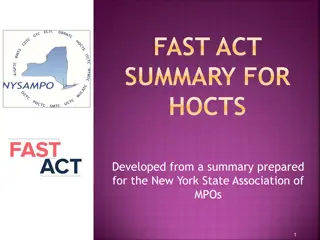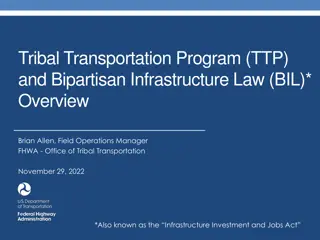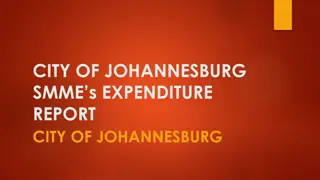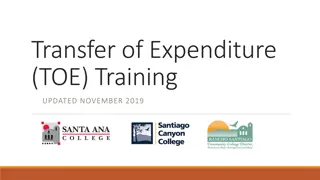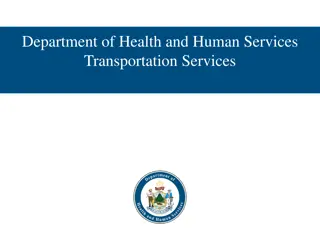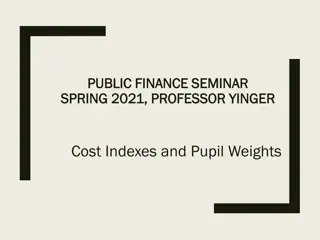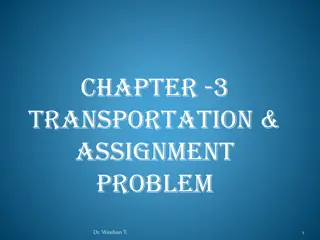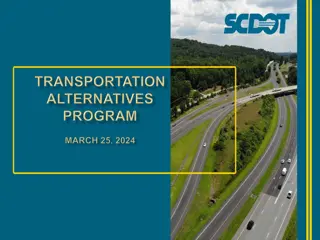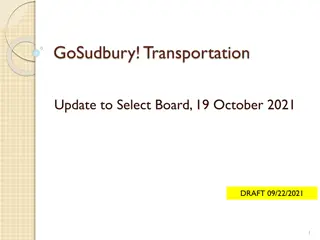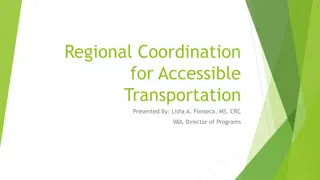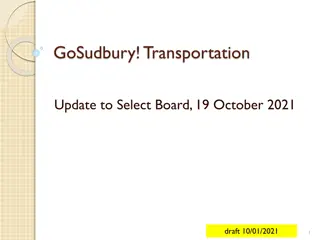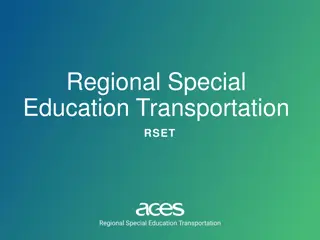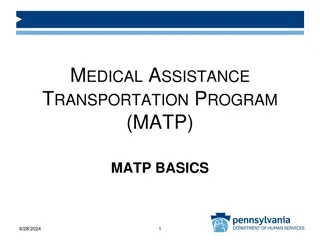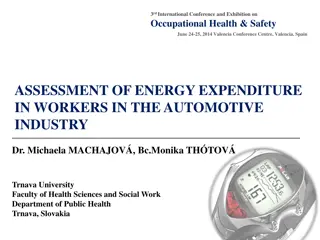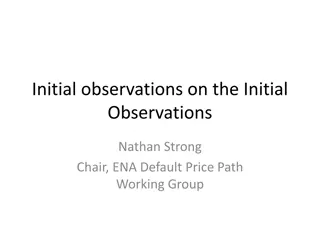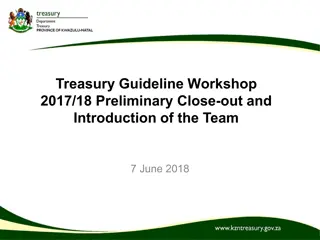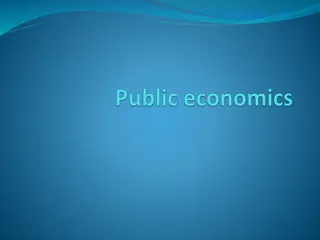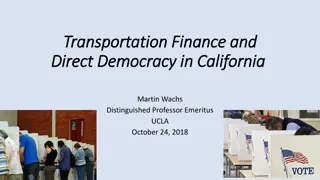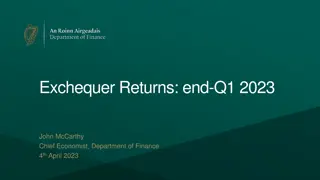Insights on Election Expenditure Monitoring in Indian State Assemblies
This presentation by Ajay Bhadoo, Deputy Election Commissioner, delves into the significance and regulations surrounding election expenditure monitoring in states like Mizoram, Telangana, Chhattisgarh, Rajasthan, and Madhya Pradesh. It covers the impact of money power, legal provisions, types of ele
0 views • 56 slides
Election Expenditure Monitoring in Karnataka State Legislative Assembly Elections
Presentation on the impact of money power in elections, the objective of election expenditure monitoring, legal provisions, machinery involved, role of expenditure observers, and focus areas for monitoring. Details on cases of rescinding elections due to detected money use, types of election expendi
0 views • 59 slides
Funding Opportunities for Non-Motorized Transportation in South Carolina
The US Department of Transportation's Federal Highway Administration provides funding to South Carolina through the Transportation Alternatives Program (TAP) to support non-motorized transportation initiatives. Local governments, schools, and other entities can partner with the South Carolina Depart
1 views • 21 slides
Transportation & Assignment Problem Overview
The transportation problem involves optimizing shipment costs from multiple sources to multiple destinations with known supply and demand constraints. This chapter discusses the characteristics of transportation problems, key assumptions, and how to formulate the transportation model. Dr. Wasihun T.
0 views • 64 slides
Briefing to the Standing Committee on Appropriations on Adjustments Appropriation Bill
The presentation by Ms. Funani Matlatsi, DDG: CFO District Development Model, covers the adjustments in the national expenditure outcome, rationale for unallocated funds, impact on LGES, financial performance of the Municipal Infrastructure Grant, measures to mitigate fund stopping, steps to settle
3 views • 37 slides
Enhancing Transportation Performance Management through TSMO Collaboration
Advancements in technology and evolving customer needs are driving changes in transportation management. Transportation Systems Management and Operations (TSMO) offers strategies to optimize operational performance, complementing traditional capacity projects. Collaboration between TSMO and Transpor
1 views • 77 slides
Contrasting Public Finance and Private Finance
Public finance involves the income and expenditure of governmental bodies, focusing on societal welfare, compulsory nature, coercive revenue collection, and long-term welfare objectives. In contrast, private finance pertains to individual financial operations, voluntary nature, income adjustments to
9 views • 42 slides
Types of Business Expenditure and Capital Expenditure Explained
Learn about the different types of expenditure in business, including capital expenditure on non-current assets like tangible and intangible items, and revenue expenditure for day-to-day trading activities. Explore examples such as machinery, goodwill, patents, trademarks, and more. Understand the d
3 views • 11 slides
Understanding Income and Expenditure Account in Accounting
Income and Expenditure Account, similar to the Profit and Loss Account, records revenue items on the credit side and expenses on the debit side. It follows the accrual concept and reflects only the current period's incomes and expenses. Surplus or deficit is shown based on the excess of income over
0 views • 4 slides
Cost Accounting Standards for Determining Transportation Costs
Understanding the importance of transportation costs in procurement and distribution, this guide outlines the standards for determining average costs, separation of transportation costs in accounting records, objectives for maintaining cost uniformity, components of transportation costs, and treatme
0 views • 11 slides
Understanding Transportation Programs and Trends
Transportation training session led by Megan Johnson, featuring topics such as Transportation Crash Course, Training Opportunities, and Transportation Trends & Updates. Includes discussions on different types of transportation services and their importance for communities.
2 views • 38 slides
Richland County Transportation Improvement Summary
Richland County's transportation improvement work includes sessions on project principles, funding options, project costs, and guidelines for utilizing the transportation penny. The focus is on addressing transportation needs, project prioritization, funding challenges, and division of funds for var
0 views • 19 slides
Understanding Unauthorised Expenditure in Public Finance Management
The presentation by Dr. Mampho Modise delves into the concept of unauthorised expenditure in public finance management as defined by the Public Finance Management Act of 1999. It explains the implications of overspending on votes or main divisions and provides insights into how unauthorised expendit
1 views • 24 slides
Principles Governing Public Expenditure: Canons of Public Spending
Public expenditure refers to expenses incurred by government authorities for maintaining governance and societal well-being. The canons of public expenditure guide governmental spending by emphasizing social benefits, efficiency, proper sanctioning, and fiscal prudence to avoid deficits.
3 views • 26 slides
Irish Government Children Expenditure Study 2019
The Irish Government's Department of Children and Youth Affairs conducted a pilot study in 2019 to analyze the expenditure on children. The report aims to develop a methodology for transparent assessment of spending on children to ensure it meets their current and future needs. Key findings indicate
4 views • 4 slides
Florida Public Emergency Medical Transportation Program Overview
The Florida Public Emergency Medical Transportation (PEMT) program aims to supplement reimbursement for emergency medical services provided to Medicaid recipients. The program, established by the Florida Fire Chiefs Association, helps offset the costs of ambulance transport by leveraging federal fun
1 views • 17 slides
Public Expenditure Management and Performance Evaluation
This content discusses the importance of Public Expenditure Review (PER) as a core diagnostic tool in evaluating government finances and guiding spending decisions. It emphasizes the analysis of public expenditures over time to align with policy priorities and achieve desired outcomes, highlighting
0 views • 33 slides
Maine DHHS Transportation Programs Overview
The Maine Department of Health and Human Services (DHHS) oversees various transportation programs aimed at providing non-emergency transportation services to low-income, child welfare-eligible, and Section 17-eligible individuals. These programs are managed through regional brokerage systems, with b
3 views • 5 slides
Importing TIMS Transportation Data into PowerSchool
Explore the process of extracting, formatting, purging, and importing TIMS transportation data into PowerSchool for efficient management of student transportation information. This includes creating TIMS extracts, updating bus stop information, and optimizing transportation planning through geocodin
2 views • 43 slides
Understanding Forward Looking Cost Base in Infrastructure Projects
Forward Looking Cost Base (FLCB) is a financial tool that helps in spreading lumpy capital expenditure over time to ensure revenue stability. It consists of key components like return of assets, return on assets, and operating expenditure. The model relies on actual expenditure, forecasts, and asset
0 views • 12 slides
Overview of FAST Act for Transportation Planning
The FAST Act, passed in 2015, authorizes federal programs for transportation development with a focus on surface transportation. It extends funding through 2020, totaling $304.7 billion. The Act aims to enhance resiliency, reliability, and stormwater mitigation in transportation systems. Planning fa
2 views • 10 slides
Tribal Transportation Program & Bipartisan Infrastructure Law Overview
The Tribal Transportation Program (TTP) and Bipartisan Infrastructure Law (BIL) provide funding for essential transportation projects in Tribal communities. The TTP Bridge Fund, Safety Fund, and High Priority Projects aim to improve infrastructure and safety. The BIL funding for FY22-FY26 totals $3.
1 views • 13 slides
City of Johannesburg SMME Expenditure Analysis: Supporting Small Businesses in 2021/2022
The City of Johannesburg's expenditure report for the 2021/2022 financial year reveals detailed spending on goods and services, with a focus on supporting Small, Medium, and Micro Enterprises (SMMEs). The report showcases expenditure breakdown by enterprise size, highlighting the substantial investm
0 views • 10 slides
Transfer of Expenditure (TOE) Training Overview
Learn about Transfer of Expenditure (TOE), including its purpose, cost principles for federal programs, accessing the TOE form, preparing a TOE, and the approval process. Understand common reasons for TOEs and the necessary steps for accurate expenditure transfers.
0 views • 14 slides
DHHS Coordination of Transportation Service Contracts Overview
The Department of Health and Human Services in Maine conducted an assessment of Transportation Services in June 2019. The workgroup identified three main priorities: alignment of Quality and Performance Measures, Safety Measures, and Evaluation of Transportation Services. The first priority involves
0 views • 28 slides
Cost Indexes and Pupil Weights in Public Finance Seminar
Explore the importance of cost indexes and pupil weights in public finance, focusing on expenditure needs, cost disparaties, and aid programs. Key concepts like expenditure need, cost index, and pupil weight are discussed along with the cost function and expenditure requirements to meet performance
0 views • 32 slides
Understanding Transportation and Assignment Problem
Transportation and assignment problems involve optimizing the shipment of goods from various sources to multiple destinations while minimizing total transportation costs. These problems deal with limited supply, known demand, constant shipping costs, and integer quantities. The transportation algori
0 views • 64 slides
Enhancing Transportation Infrastructure Through Federal Funding Programs
The Transportation Alternatives Program (TAP) funded by the USDOT's Federal Highway Administration supports transportation projects in South Carolina based on population categories. TAP funds are allocated to Transportation Management Areas (TMAs), Small Urban Areas, and Non-Urban Areas, prioritizin
0 views • 21 slides
Addressing Transportation Gaps in Sudbury: A Livable Community Approach
The Sudbury Transportation Committee, established by the Select Board, aims to enhance transportation in Sudbury to create a livable community. Focusing on inclusivity, equity, and addressing transportation gaps impacting various aspects of livability, the initiative seeks to improve social particip
0 views • 16 slides
Understanding Regional Coordination for Accessible Transportation
This presentation delves into the concept of regional coordination in accessible transportation, focusing on the Regional Transportation Advisory Panel, 5-year regional transportation goals, and the significance of the Safe, Accountable, Flexible, Efficient Transportation Equity Act. It emphasizes t
0 views • 16 slides
Enhancing Livability in Sudbury Through Transportation Initiatives
The GoSudbury! Transportation Update to the Select Board on October 19, 2021 highlights the importance of addressing transportation as a key component of livable communities. The initiative aims to create a safe, secure, and inclusive environment by improving transportation options for residents of
0 views • 26 slides
Regional Special Education Transportation (RSET) Program Overview
RSET, which stands for Regional Special Education Transportation, is an initiative developed by ACES to help districts save money while safely transporting students to out-of-district placement sites. The program benefits districts by reducing transportation costs, addressing parent concerns, and ma
0 views • 13 slides
Understanding Pennsylvania's Medical Assistance Transportation Program (MATP)
The Medical Assistance Transportation Program (MATP) in Pennsylvania provides essential transportation services to access medical care. Governed by state plans and codes, MATP aims to offer access to medical, pharmacy services, chronic disease management, and preventative care. Transportation provid
0 views • 16 slides
Assessment of Energy Expenditure in Automotive Workers: A Study at an International Occupational Health Conference
This study presented at an international occupational health conference in Valencia, Spain, aimed to assess the energy expenditure of workers in the automotive industry. The research involved measuring heart rate and energy consumption using Polar RS 400 devices, comparing results with Slovak regula
0 views • 13 slides
Analysis of Expenditure Plans in DPP Reset Working Group
The ENA's working group is examining approaches for forecasting key components in the DPP reset, with short and long-term considerations. Industry feedback focuses on data variations, categorization issues, and the need for accurate models to explain expenditure plans. Significant variation and a st
0 views • 10 slides
2017/18 Preliminary Financial Close-out Analysis
Summary of the 2017/18 preliminary financial close-out and analysis presenting provincial revenue, expenditure outcomes, and under-expenditure. It includes details on revenue collected by department, expenditure analysis by vote, and the overall under-spending of R704.594m, equivalent to 0.6% of the
0 views • 19 slides
Theories of Growth in Public Expenditure: Adolph Wagner's Hypothesis
Adolph Wagner, a prominent German economist, put forth a hypothesis on the growth of public expenditure, linking it to economic development. Wagner's theory suggests that as per capita income rises, public expenditure increases proportionally due to expanded traditional functions, coverage of new fu
0 views • 35 slides
Transportation Finance and Direct Democracy in California
Proposition 6 on November 6th has garnered attention, but voters in multiple states will decide on over 250 transportation ballot measures totaling over $55 billion. California, with a longer history and greater funding needs, has been at the forefront of transportation investments, including the us
0 views • 29 slides
Financial Risk Protection and Equity in Health Systems
This content discusses measures of financial risk protection in healthcare, including catastrophic health expenditure and impoverishment due to health payments. It highlights data from countries like Laos and Mongolia on household expenditure and factors affecting catastrophic health expenditure. Th
0 views • 15 slides
Overview of Exchequer Returns for End-Q1 2023
The Exchequer Returns for End-Q1 2023, as reported by John McCarthy, Chief Economist of the Department of Finance, indicate a year-on-year increase in total revenue, driven by growth in tax revenue. However, non-tax revenue decreased significantly. Expenditure also saw a notable rise, particularly i
0 views • 12 slides

